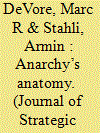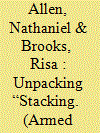| Srl | Item |
| 1 |
ID:
171209


|
|
|
|
|
| Summary/Abstract |
No issue deserves more scrutiny than the mechanisms whereby popular unrest unleashes civil wars. We argue that one institution – two-tiered security systems – is particularly pernicious in terms of the accompanying civil war risk. These systems’ defining characteristic is the juxtaposition of small communally stacked units that protect regimes from internal adversaries with larger regular armed forces that deter external opponents. These systems aggravate civil war risks because stacked security units lack the size to repress widespread dissent, but inhibit rapid regime change through coup d’état. Regular militaries, meanwhile, fracture when ordered to employ force against populations from which they were recruited.
|
|
|
|
|
|
|
|
|
|
|
|
|
|
|
|
| 2 |
ID:
188798


|
|
|
|
|
| Summary/Abstract |
This article unpacks the phenomenon of identity-based stacking in armed forces to lay the groundwork for a next generation of scholarship, proposing three sets of extensions with examples from regimes in Africa and the Middle East. First, we argue that scholars might treat the concept of stacking with greater nuance by considering variation in stacking’s modal forms, incorporating identities beyond ethnicity, considering how the salience of stacking varies within armed forces, and treating the identities on which stacking is based as malleable. Second, we argue for a more attention to the mechanisms through which stacking operates, such that it can involve layering of multiple bases of identity, be used to manipulate and manufacture identity, and be used to induce in-group competition and rivalry. Finally, stacking scholarship should consider more the costs to a leader’s control over policy and distributional matters and emphasize the trade-offs that various forms of stacking generate among regime security imperatives.
|
|
|
|
|
|
|
|
|
|
|
|
|
|
|
|